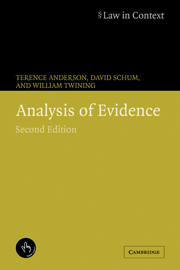Book contents
- Frontmatter
- Contents
- Preface
- Acknowledgments
- Tables of cases and statutes
- Table of legislation and rules
- List of abbreviations
- 1 Evidence and inference: some food for thought
- 2 Fact investigation and the nature of evidence
- 3 Principles of proof
- 4 Methods of analysis
- 5 The chart method
- 6 Outlines, chronologies, and narrative
- 7 Analyzing the decided case: anatomy of a cause célèbre
- 8 Evaluating evidence
- 9 Probabilities, weight, and probative force
- 10 Necessary but dangerous: generalizations and stories in argumentation about facts
- 11 The principles of proof and the law of evidence
- 12 The trial lawyer's standpoint
- Glossary of terms and symbols
- References
- Index
2 - Fact investigation and the nature of evidence
Published online by Cambridge University Press: 23 November 2009
- Frontmatter
- Contents
- Preface
- Acknowledgments
- Tables of cases and statutes
- Table of legislation and rules
- List of abbreviations
- 1 Evidence and inference: some food for thought
- 2 Fact investigation and the nature of evidence
- 3 Principles of proof
- 4 Methods of analysis
- 5 The chart method
- 6 Outlines, chronologies, and narrative
- 7 Analyzing the decided case: anatomy of a cause célèbre
- 8 Evaluating evidence
- 9 Probabilities, weight, and probative force
- 10 Necessary but dangerous: generalizations and stories in argumentation about facts
- 11 The principles of proof and the law of evidence
- 12 The trial lawyer's standpoint
- Glossary of terms and symbols
- References
- Index
Summary
“Have you ever given any attention to the Science of Evidence?” said Mr. Grodman. “How do you mean?” asked the Home Secretary, rather puzzled, but with a melancholy smile. “I should hardly speak of it as a science; I look at it as a question of common sense.”
“Pardon me, sir. It is the most subtle and difficult of all the sciences. It is indeed rather the science of the sciences. What is the whole of inductive logic, as laid down (say) by Bacon and Mill, but an attempt to appraise the value of evidence, the said evidence being the trails left by the Creator, so to speak? The Creator has (I say it in all reverence) drawn a myriad red herrings across the track. But the true scientist refuses to be baffied by superficial appearances in detecting the secrets of Nature.”
Introduction: connecting the dots
Everyone draws inferences from evidence. The dog barks, you infer that someone is approaching the house; a loud horn sounds behind me, I infer that the driver is impatient or angry; there is a peculiar smell in the playroom after last night's teenage party; cigarettes? Hash? Or just leftover pizza? There is a fresh scratch on the front fender of my car with traces of red paint; Aunt Edna has just roared off in her new red Ferrari. There are dark clouds overhead, footprints in the sand, lipstick on the shirt, fingerprints on the steering wheel of a stolen car.
- Type
- Chapter
- Information
- Analysis of Evidence , pp. 46 - 77Publisher: Cambridge University PressPrint publication year: 2005



